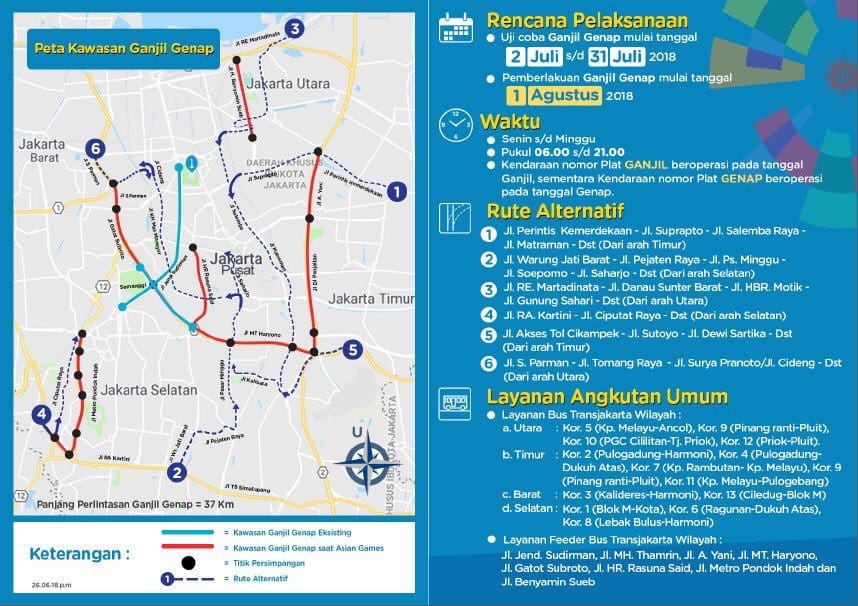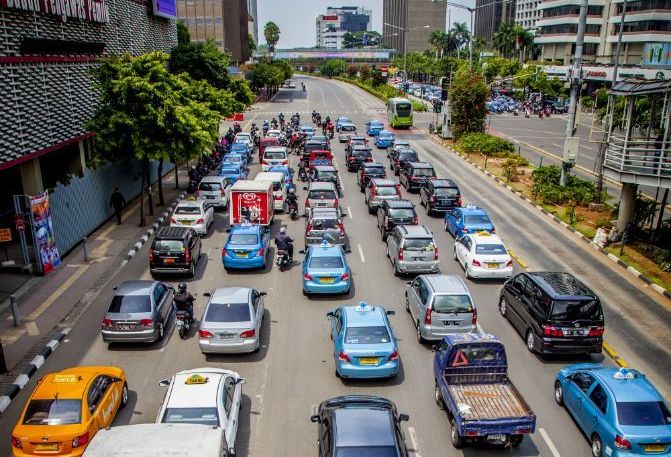Ahead of the start of the Asian Games on August 18, the Jakarta Government has been conducting a test expansion of the odd-even traffic rule in the hopes that it can help tame some of the capital’s notoriously awful traffic so that, once the massive sporting event begins, athletes and sports officials will be able to make it to their venues in a reasonable amount of time (they will also be shutting down some of the capital’s toll gates for that reason as well).
The government previously claimed that, just two weeks into the test, the expanded odd-even rule had led to an increase in average vehicle speeds of 12% and decreased travel times and air pollution levels as well. Now in its third week, the expansion is also being credited with a significant increase in the number of public transportation users.
The head of the Greater Jakarta Area Transportation Management Agency (BPTJ), Bambang Prihartono, said public transport passengers began to increase since the odd expansion trial was first came into effect on July 2.
“Currently, the shift to public transportation has started to increase. Use of the Transjakarta is up 11.4 percent, which is remarkable,” Bambang told the media today as quoted by Kompas.
Bambang said BPTJ did not yet have data on how much private car usage had decreased during the same period but said they would get those numbers soon in order to better evaluate the policy.
Separately, Transjakarta’s head of public relations, Wibowo, gave similar figures, saying that they had seen about a 10% increase in busway users in areas affected by odd-even expansion.
The trial expansion of the odd-even rule — which only allows vehicles with odd-numbered plates to use certain major roads during rush hours on odd calendar dates and vice-versa — began on July 2 with a a month-long awareness drive before the expansion officially comes into effect on August 1.

This map below, from the Jakarta Transportation Agency, details exactly which roads are now covered by the odd-even rule. The light blue lines represent the roads where the odd-even rule was previously enforced, while the red lines represent the new additions and the blue dotted lines represent suggested alternate routes (be warned: they will be jammed more than usual).
The biggest expansion stretches all the way from Jalan S. Parman in West Jakarta, through Gatot Subroto, M.T. Haryono, D.I. Panjaitan, Jenderal Ahmad Yani up to Cempaka Putih in Central Jakarta, measuring close to 22km.
The other three points of expansion are: South Jakarta’s Jalan Arteri Pondok Indah — Kebayoran Baru, Jalan H.R. Rasuna Said, and Central Jakarta’s Jalan Benyamin Sueb, Kemayoran.
In addition, under the expansion, the odd-even rule is now be enforced for 15 hours every workday, from 6am to 9pm. This is much longer than the 7am-10am and 4pm-8pm rush hour windows prior to the expansion.
During the trial period, violators of the odd-even rule won’t be fined, but starting August 1, the IDR500K (US$34.74) fine applies.
The Jakarta Provincial Government has not decided on whether or not the expansion will still apply after the Asian Games concludes on September 2, but there has been talk that they are considering making it permanent beyond the Games. Considering all the apparent benefits it has brought, it seems like keeping it should be the obvious choice.




